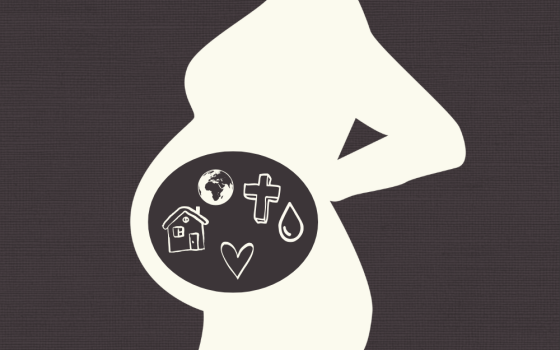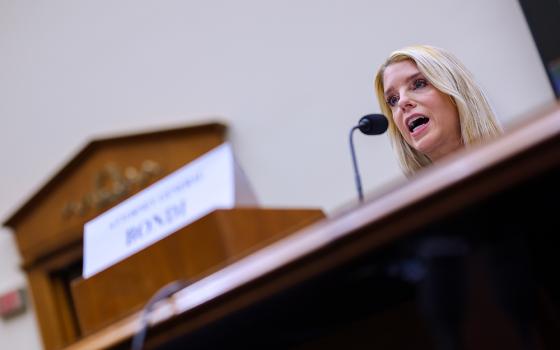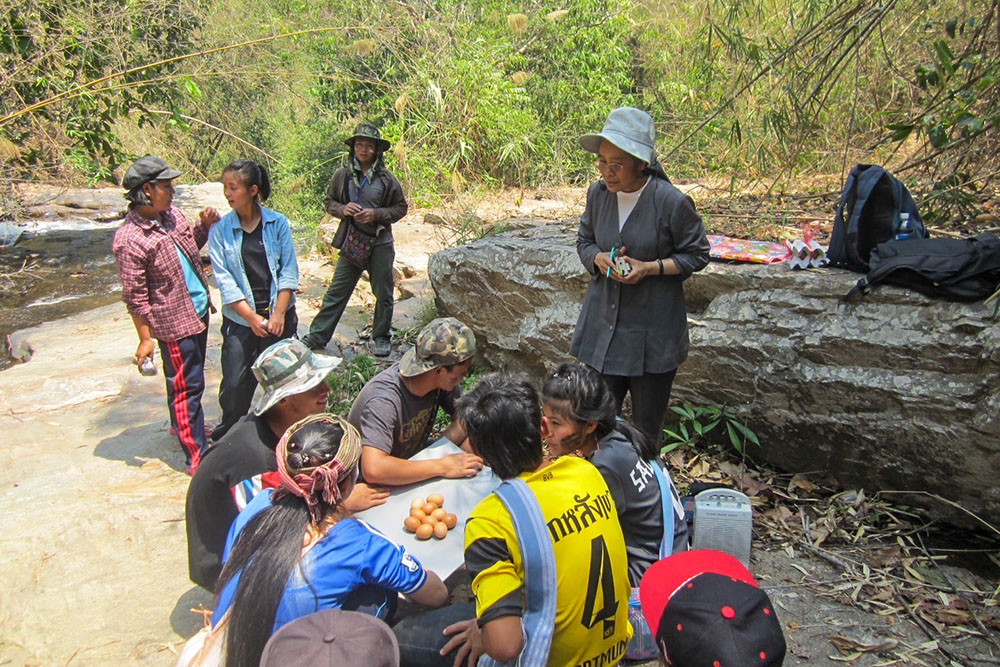
St. Paul de Chartres Sr. Marie-Agnes Suwanna Buasap works among the hill tribes in Chiang Mai, Thailand. The Thai government recently honored her as an "Outstanding Person Award for the Prevention and Suppression of Human Trafficking" for her efforts in fighting human trafficking. (Courtesy of Marie-Agnes Suwanna Buasap)
The Thai Ministry of Social Development and Human Security awarded Sr. Marie-Agnes Suwanna Buasap the "Outstanding Person Award for the Prevention and Suppression of Human Trafficking" on June 5 for her efforts in fighting human trafficking.
Since 2018, Buasap, 61, a member of the Sisters of St. Paul de Chartres, has been involved with Talitha Kum, the Rome-based international network of Catholic women religious working on anti-trafficking initiatives. In Thailand, Buasap founded Talitha Kum Kids, noted for "training over 3000 teachers in numerous schools, and strengthening the leadership of the Talitha Kum Youth Ambassadors to promote peer-led awareness," according to the international Talitha Kum.
Buasap shared her work and challenges with Global Sisters Report.
GSR: How do you feel about receiving an anti-trafficking award?
Buasap: The award isn't for me, but for the work of Talitha Kum. I'm excited because we're fighting human trafficking together with Talitha Kum. So, Talitha Kum is the reason for this joy.
The award recognized your "courageous, creative, and sustained" efforts in addressing trafficking. Can you explain?
Consider Mae Woei, a woman willing to work with us. The economy of her impoverished village was collapsing, and poverty and a lack of awareness made and continue to make people like her vulnerable to trafficking.
Her villagers considered growing a cash crop. Mae pointed out that almost everyone in the village grows chili peppers, and they have more than they need. We had some grant money and used it to buy chili peppers, paying up front, then gradually selling them.
We expanded to more villages, and interest increased among the people, especially the Karen, who realized they could benefit from selling chili peppers.
We cannot discuss legal cases involving kids. It is enough to say that we care for children in difficult situations. We recognize children are suffering because of poverty or isolation caused by single-parent households and support them financially and through counseling for both them and their parents.
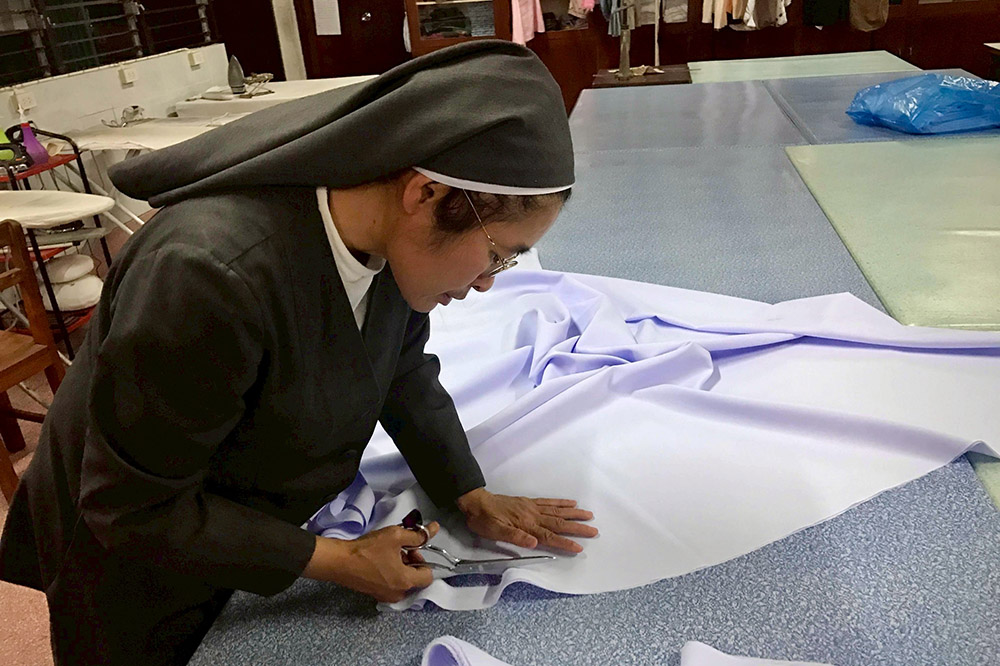
St. Paul de Chartres Sr. Marie-Agnes Suwanna Buasap teaches sewing to women and girls in Thailand. (Courtesy of Marie-Agnes Suwanna Buasap)
Please elaborate on the anti-human-trafficking work for which you received national recognition.
We do not engage in arresting or prosecuting criminals. We train people to prevent trafficking and child abuse.
In 2023, I addressed our congregation, stating that every educational circle must focus on teaching about human trafficking issues. Then, I reached out to schools and individual directors. Talitha Kum was happy to provide training and help teachers incorporate integrated teaching, assisting them in making minor adjustments.
Inside the Thai school system, there is no mention of human trafficking. So, we introduced this topic, and now when teams from the National Education Standards and Quality Assessment visit to evaluate Catholic schools, they see that we care about keeping children safe. Even adults often lack awareness of its importance because many associate fighting human trafficking with prosecution.
In schools, teachers wondered about the link between human trafficking and their institutions. When we train teachers in schools, they ask permission to leave and share with their fellow teachers, who might not have known about this before.
Our work inspired teachers to assist children in accessing help, and the children felt more confident talking to their parents. We supported many children who were exploited online.
Advertisement
Schools contact us to discuss these cases. Sometimes, we encourage them to file police reports and collaborate with law enforcement. Often, police identify victims quickly because they see them online, but they can't always reach them for various reasons. Now, with our help, they can locate victims faster and provide assistance.
How did your congregation and the church support your mission?
My congregation recognizes this work as part of the work of religious in Thailand. It supports us with personnel. However, we haven't asked for money from the congregation because we can still manage. Initially, the International Union of Superiors General [which launched the Talitha Kum network] supported our activities. But they stopped several years ago.
When we train schoolteachers, the schools cover our expenses and pay a fee for the speaker. We deposit this money into a Talitha Kum common fund that covers our expenses, including travel, lodging and other related costs.
We also receive donations from various religious congregations and individuals who support our work. Contributions are deposited into a common fund.
We haven't requested funds from the bishops' conference, and they haven't offered any assistance yet. It feels like Talitha Kum is seen as belonging to religious women, even though the religious are under the bishops' authority. Why don't they bring it up?
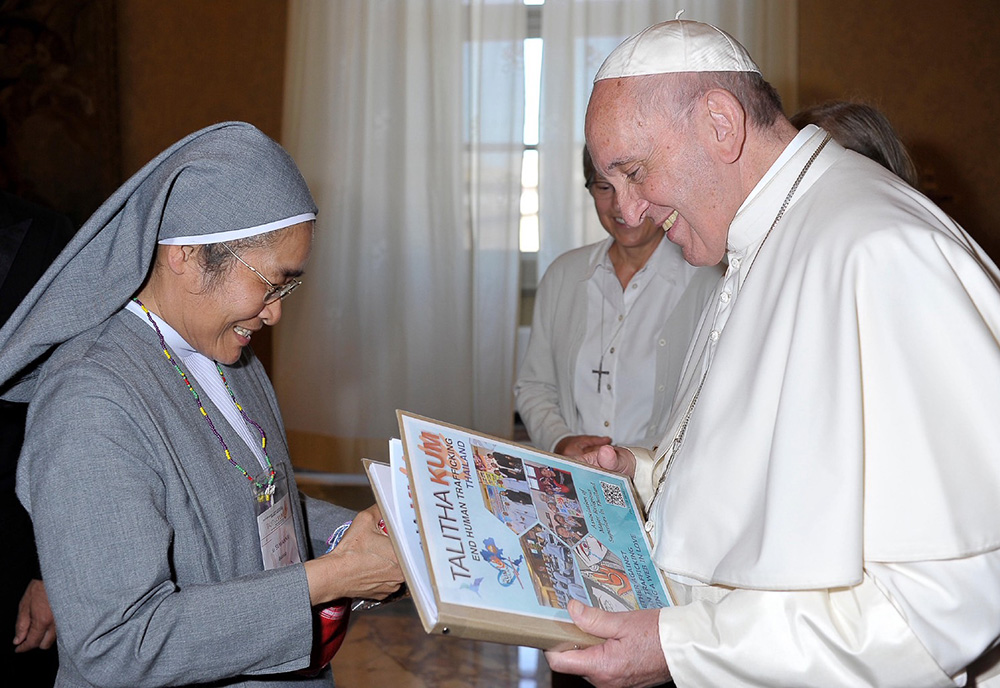
St. Paul de Chartres Sr. Marie-Agnes Suwanna Buasap meets the late Pope Francis. (Courtesy of Marie-Agnes Suwanna Buasap)
Are missions like yours responsible for the global slowdown in trafficking activities?
I can't speak definitively, but more nongovernmental agencies are active in this field. When I now attend meetings, I see more agency representatives from countries like Japan and Korea. That's a change.
In Thailand, we have a nongovernmental organization called A21. We learned that a child was a victim of abuse, and A21 came to care for her. Its volunteers also visit me.
When a child is sexually abused, the child is often blamed and stigmatized. However, the child was abused to the point of losing herself. Then A21 helped, and a police officer investigating the case came to see me. At one point, he was about to close the case because the victim was saved.
However, we wanted the criminal to be arrested and punished. The police worked to track him down. One day, I received a message from the officer: "It's finished, we caught him."
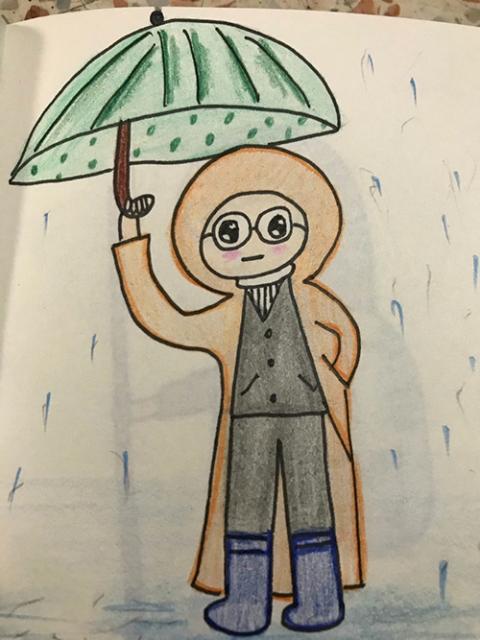
Art made by a child who was a victim of human trafficking (Courtesy of Marie-Agnes Suwanna Buasap)
But the child still requires ongoing therapy to fully recover. For most agencies, the case ends once the victim is rescued; for some others, it continues until the criminal is caught. However, almost no one, except the Catholic religious, focuses on helping the victim rebuild their life. The issue of anti-trafficking is complex with many facets. No one can say exactly how much therapy is needed to help a victim move forward.
How do your anti-trafficking activities differ from other efforts?
When we start helping children by giving them time and listening to them, it increases our understanding of their needs — allowing them to avoid self-harm, helping them recognize the sacredness within themselves, and the dignity of being human. Ultimately, if there's an opportunity to discuss how God created them this way — despite facing terrible things — they can still move forward.
What is your message to those who may consider starting a mission against trafficking?
Open your eyes and open your heart. And be a friend to those who are happy, and be a friend to those who are sad at the same time. And we can be small hands that reach out and pull them up. We need to find more helpers. We can't do the work alone anyway.
You see an image of a hand with a circular pattern in the Talitha Kum logo. It is the hand of Jesus reaching out to grasp the child. The circular pattern symbolizes movement; it could also represent the movement of the Holy Spirit at work in our hands. Our hands might reach out to children who need care and attention.




